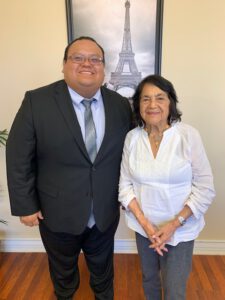
A non-profit organization based in the Central Valley is making life better for the people of Tulare County and the surrounding areas. The Dolores Huerta Foundation (DHF) was created in 2002 by its namesake, who worked with Cesar Chavez to found the United Farm Workers.
Dolores Huerta is famous for her efforts to improve life for women, farmer workers, and those from low income areas. Originally based in Delano, today Huerta’s initiatives span across the Central Valley, helping people in multiple counties and various walks of life.
One of their community organizers, Angel Ruiz, sat down with the Valley Voice to discuss how the non-profit changes lives.
Originally from LA, Ruiz holds a bachelor’s degree in political science and a certificate in translation and interpreting. He interviewed with the Dolores Huerta Foundation while figuring what career to pursue and ended up moving to the Central Valley to become a community organizer for the group.
Ruiz says that the group’s “Si Se Puede” or “Yes We Can” attitude inspires him–he described it as a belief “that everything is possible with hard dedication and hard work.” And with that mindset, DHF has targeted injustices.
Since the COVID-19 vaccine became available to the public, the foundation has been sending members to disadvantaged areas, where they distribute flyers, make appointments, and provide vaccinations to anyone who wants it. So far, they’ve helped over 8,000 people get vaccinated in Kern and Tulare County, and are still working to increase that number. They focus on the Latino community, which is harder hit by heart attacks, high blood pressure, and other conditions that worsen COVID-19 outcomes.
And vaccination isn’t the only health-related issue in the works–next, the organization aims to target obesity, diabetes, and other issues that particularly affect Latino and low income communities.
The DHF also works to improve the valley’s civic engagement, a persistent struggle in the region.
“DHF is instrumental in grassroots organizing for local and state legislation,” Ruiz said.
Not only did they work with the US Census in 2019 to successfully contact 84,000 people through sending volunteers door to door as well as to flea markets or wherever else they could meet with those they hoped to reach, DHF recently campaigned for adherence to redistricting criteria by the County Board of Supervisors for Redistricting, one of Ruiz’s projects. The foundation submitted a series of possible maps that ensured population equality and community integrity. Kaweah Health accepted one of the maps for its own Board elections. DHF is still working to improve voter rights in the Central Valley, preparing to educate the public about their voting rights before the next elections.
Much of this groundbreaking work is possible thanks to their Geographic Information System, or GIS. Through their GIS department, a specialty of Ruiz’s, the non-profit is able to analyze population data, determining which areas have the least access to vaccination or which groups have the lowest percentage of registered voters. According to Ruiz, this technology has been fundamental in their overall success.
Members of the public can view the GIS map of the Central Valley on the Dolores Huerta Foundation’s website.
Campaigns benefiting local youth are some of DHF’s most important projects.
The organization’s Education Department, currently working on campaigns in Tulare, Kern, and Fresno County, pushes for policies that make school fair for all students. A Dolores Huerta curriculum, implemented in districts throughout California, encourages students to stand up for social justice and human rights.
Meanwhile, DHF’s Education Department works to prevent private of charter K-12 schools that require an application from rejecting students based on ethnicity or income, one of their various efforts to end the school to prison pipeline.
The youth program also involves bringing young people into the organization to both volunteer and learn career skills: students from 7th through 12th grade work with staff at the foundation to help the organization’s initiatives, partake in activities like camping or cooking, and develop expertise in areas that will help them find jobs in areas that can lead the kids to improve social justice in the Valley.
One of DHF’s most important projects consists of the chapters Vecinos Unidos, or Neighbors United. These groups offer classes on everything from filing taxes through workers’ rights. Nine total chapters enable 700 people to learn 21st century skills, speak with superintendents, and ultimately become more active members of their community. The project will soon be partnering with Fresno State to give computer classes to low income communities, with the goal of empowering learners to seek positions where they can use their newfound skill sets.
They hope to help even more people as time goes on–in Ruiz’s words, “We continue to organize for equal opportunities and resources in the communities that have been systematically underrepresented.”
More information on how to help can be found at www.doloreshuerta.org.

DHF does good work. There is a lot of latent racism in Tulare and Kings counties. Eroding the racist power structure will take years, but progress is being made.
Dolores Huerta is one of the most respected women in the American civil rights movement.
GOOD JOB DHF!!! Angel keep working hard bud. You are AMAZING!!!!!!! 🙂